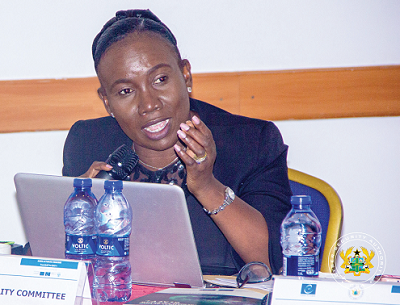
Critical state institutions need support to combat cybercrime — Appeal Court judge
An Appeal Court Judge has called for support for security-sector institutions to enable them to discharge their mandate effectively. Justice Afia Serwaa Asare Botwe who made the call, asserted that when state institutions were entrusted with responsibilities, businesses and people expected them to deliver on their mandate.
She emphasised that institutions that usually received reported cybercrime incidents were met with challenges in obtaining reliable evidence and the appropriate logistics to aid effective remedial measures.
That, she stressed, resulted in delays in investigations, leaving elements of unsolved cases.
Event
Justice Asare Botwe was delivering remarks on behalf of the Director General of the Cyber Security Authority (CSA), Dr Albert Antwi-Boasiako, at the Public Consultation on the Second
Additional Protocol to the Convention on Cybercrime on Enhanced Co-operation and Disclosure of Electronic Evidence in Accra.
In attendance were Mrs Mavis Amoa, the Director of Legislative Drafting, Office of the Attorney-General and Ministry of Justice, members of the Joint Cybersecurity Committee, representatives and experts from the Council of Europe.
Justice Botwe maintained that the myriad of logistical challenges faced by some critical state institutions hindered timely remedial interventions against cyber criminals and adversely affected their ability to deliver.
According to her, the conversation on minimising cybercrime activities in the country especially could only commence with the provision of robust logistical and sustainable funding support from the state and international partners.
The event, which was held under the auspices of the Council of Europe and the Cyber Security Authority, is part of preparatory measures for the Government of Ghana to sign the Second
Additional Protocol to the Convention on Cybercrime on Enhanced Co-operation and Disclosure of Electronic Evidence.
Approval
The Second Additional Protocol was formally approved on November 17, 2021, and opened for signature by the Parties to the Convention on Cybercrime on May 12, 2022.
Ghana ratified the Convention on Cybercrime on December 3, 2018, and it entered into force on April 1, 2019.
The Second Additional Protocol contains important new provisions to further enhance cooperation and disclosure of electronic evidence to support countries in effectively tackling cybercrime and other crimes involving electronic evidence.
To this end, Justice Asare Botwe stressed that “the ripple effect of cyber activities and its borderless nature tend to garner international attention hence the call for cooperation among state institutions and countries at large”.
A representative of the Serbian Cybercrime Convention Committee, Branko Stamenkovic, remarked that as a member of the Budapest Convention on the Global Action on Cybercrime, “Ghana has been a true ally when it comes to protecting its citizens, economy, and political systems”. According to him, Ghana’s continued commitment to expanding its criminal justice capacities could easily be witnessed by the numerous activities the country had participated in since 2016 with the assistance of the Global Action on Cybercrime, Extended (GLACY+), a joint project of the Council of Europe and European.
